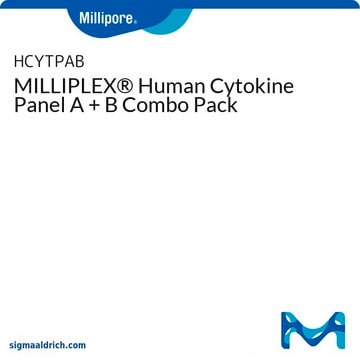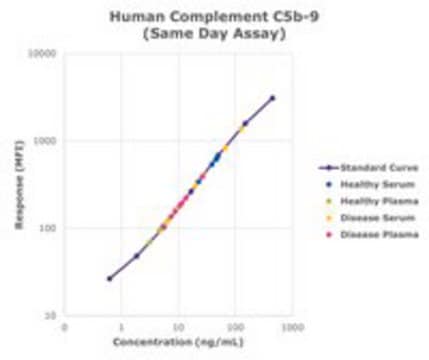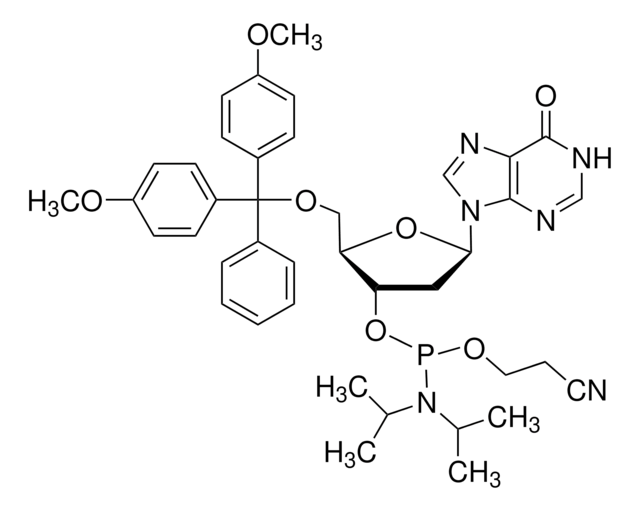03-0207-00
SMC® Human PD-1 High Sensitivity Immunoassay Kit
Sinônimo(s):
PD-1 Single Molecule Counting kit, PD-1 ultra-sensitive immunoassay, PD-1 immunoassay kit, Programmed cell death protein 1 kit, PD-1 kit
About This Item
Produtos recomendados
reatividade de espécies
human
Nível de qualidade
Parâmetros
50 μL sample volume (diluted 2-fold in standard diluent)
assay range
intra-assay cv: ≤5%
(n=15)
linearity: 80-117%
(Plasma)
linearity: 91-135%
(Serum)
recovery range: 53-100%
(Plasma)
recovery range: 80-109%
(Serum)
sensitivity: 1.74 pg/mL
standard curve range: 0.87-3,000 pg/mL
inter-assay cv: ≤14%
(n=15)
técnica(s)
single molecule counting: suitable
entrada
sample type plasma (K2 EDTA)
sample type serum
Condições de expedição
wet ice
temperatura de armazenamento
2-8°C
Categorias relacionadas
Descrição geral
Research Category: Cancer
Research Sub-Category: Immuno-Oncology
Especificidade
Aplicação
Características e benefícios
- Accurate and reproducible performance on the state-of-the-art SMCxPRO® ultrasensitive immunoassay system.
- Compatiblity with automated liquid handling
Informações legais
Exoneração de responsabilidade
Palavra indicadora
Danger
Frases de perigo
Declarações de precaução
Classificações de perigo
Acute Tox. 4 Dermal - Acute Tox. 4 Inhalation - Acute Tox. 4 Oral - Aquatic Chronic 3 - Eye Irrit. 2 - Repr. 1B - STOT RE 2 Inhalation
Órgãos-alvo
Respiratory Tract
Código de classe de armazenamento
6.1C - Combustible acute toxic Cat.3 / toxic compounds or compounds which causing chronic effects
Certificados de análise (COA)
Busque Certificados de análise (COA) digitando o Número do Lote do produto. Os números de lote e remessa podem ser encontrados no rótulo de um produto após a palavra “Lot” ou “Batch”.
Já possui este produto?
Encontre a documentação dos produtos que você adquiriu recentemente na biblioteca de documentos.
Conteúdo relacionado
Guide on selecting immunoassay platforms including multiplex vs. singleplex assays, instruments, software, and services.
Explore ultrasensitive immunoassay technology with SMC® technology, including its biomarker detection platform, advantages of high sensitivity assays, and more.
Discover cancer research resources with modeling and profiling tools for cell culture, genomics, biomarkers, and more to help maximize your cancer research.
Use the power of high sensitivity immunology assays with SMC® technology to precisely characterize low-abundant cytokines like those from Th1/Th2 and Th17 cells.
Nossa equipe de cientistas tem experiência em todas as áreas de pesquisa, incluindo Life Sciences, ciência de materiais, síntese química, cromatografia, química analítica e muitas outras.
Entre em contato com a assistência técnica










